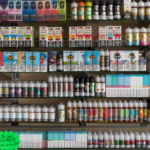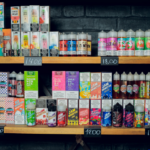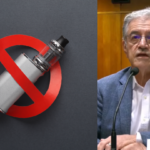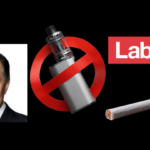Vapes Are Legally Available Without Prescription in NSW, But Only at Chemists
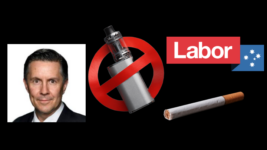
Health minister Mark Butler’s elaborate scheme to eradicate recreational vaping in the community, had meant that since 1 July 2024, vapes had only legally been available via prescription at pharmacies. However, this came to an end on Tuesday, 1 October 2024, as a Greens amendment to the legislated framework sees the devices now available over the counter at chemists.
Butler launched his war on vapes at the National Press Club in May 2023. The attack on vaping was not unexpected, as the Australian establishment has always treated this alternative to smoking with circumspection, and the main thrust of the campaign against the harm reduction alternative to smoking has been due to a rise in teenage vaping, with some incidents of hospitalisation as a result.
The new scheme has left tobacco harm reduction advocates livid, as the removal of legal vapes from stores where cigarettes remain available has made it difficult for adults to obtain and more likely to turn to the black market kind or smoking, while teens will be able to continue buying illegal vapes, of which they bought previously, as there had been restrictions on the selling legal vapes to minors.
And with the restoration of vapes to an over-the-counter product, albeit with the imposition of availability only at pharmacies, which too involves an exchange of details at point of sale, many chemists are complaining of having to distribute them, especially as the Therapeutic Goods Administration has not yet approved any of these products, leaving only unapproved vapes available.
A perfect mess
The health minister outlined the intentions of the vaping crackdown in May 2023, which included ending the import of nonprescription vapes, restricting vaping flavours, banning disposable vapes and ending retail availability, including in convenience stores, whilst he further outlined this would be taking place alongside tobacco reduction reforms without any noted contradictions in aim.
Butler then announced last November that the government was implementing a ban on disposable single use vapes as of January, which would then be followed by March reforms that went on to see an end to the ability to personally import vapes and a ban on reusable recreational imports. And the minister also had his photo taken at the border following a seizure as the war on vapes kicked off.
The second tranche of reforms first appeared before parliament in March 2023, when the Therapeutic Goods and Other Legislation Amendment (Vaping Reforms) Bill 2024 was tabled. Seeking to ensure that recreational vapes were no longer available and prescription-only therapeutic vapes were solely available at chemists, these laws passed in late June and came into effect on 1 July.
But at the last minute, the Greens moved an amendment that ended the prescription-only requirement to obtain vapes three months after it took hold, which means vapes are now once again available to all adults over the counter but only at pharmacies, with a brief consultation, and only in three flavours – mint, menthol and tobacco – and these devices can basically be used recreationally.
And as for teenagers, they can obtain legal vapes from the chemist with a doctor’s prescription. However, it is likely they can still obtain illegal vapes under the counter elsewhere and these black market imported products are often what they’ve always been using as these were the only vapes available for purchase that contained nicotine, as legal vapes sold in stores were nicotine-free.
A safer alternative
So, as of July, Australia became the first nation in the world to insist that vapes are only available via prescription and at pharmacies, with health minister Butler attempting to eradicate their recreational use, but as of Tuesday, adults can now obtain legal nicotine vapes from pharmacists more easily than ever before. However, this remains problematic for the Pharmacy Guild of Australia.
The availability via a chemist requires an exchange of details and a brief consultation with a staff member at point of sale, which means that tobacco and cigarettes continue to be somewhat more convenient to obtain than vaping, which was initially rolled out in the mid-2000s as a safer alternative to carcinogenic cigarettes, as the habit continues to be 95 percent safer than smoking.
But not all nations have gone down this path, the New Zealand Ministry of Health promotes vaping as a much safer alternative to tobacco. NZ Health says it has the potential to help people quit smoking and it produces information to assist people in transitioning to the smoking alternative. And this incorporates the understanding that while nicotine is addictive, it’s the smoke that causes harm.
Much of the scare around vapes of late has involved a rise in teen use, however those same recent years have also seen some of the lowest smoking rates amongst local teens ever. And if those that were vaping were able to obtain the legally nicotine-free quality-controlled recreational vapes that were legally sold to adults, they’ll now be left to buy whatever type is on the black market.
The other key issue was teens being hospitalised due to nicotine toxicity, which occurs due to high levels of nicotine. This means these are teens who’ve been using illegal imported vapes that contained nicotine but didn’t go through any local quality control process and black market products available before the reforms are likely to be still available at a higher price post-prohibitive measures.
The Pharmacy Guild of Australia, which represents 5,800 chemists, told the ABC this week that it rejects the new changes. The body states that it’s problematic to be selling unapproved goods without a script to the public, as the TGA is yet to approve any vapes, and several of the nation’s largest chemist chains have previously stated they won’t sell vapes without prescriptions.
So, it would appear that the nation is waiting for a local expert to advise health minister Butler that it might be a good idea to sell nicotine vapes at the same locations as cigarettes, with the requirement of a proof of age ID to acquire them, so adults have the safer alternative more readily available.


